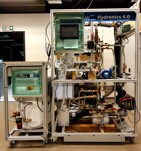The laboratory deals with the design, development and testing of innovative heating systems. Currently, the research is focused on the development of a distributed pump system, which is based on the so-called single-pipe topology. The team's vision is a heating system that minimizes both installation costs thanks to a simpler topology and operating costs by using modern predictive algorithms for heating buildings. The test equipment provides all the necessary sensory equipment and a wide range of control options for actuators. All data is continuously recorded, and the experiment can be controlled completely remotely.


